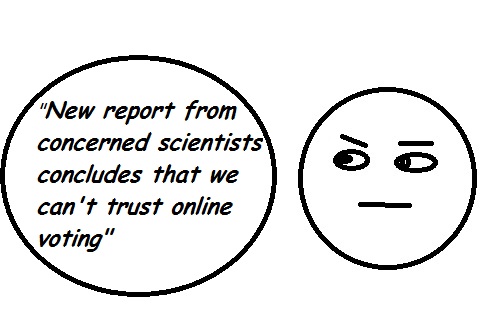Doubt the doubters. Deny the deniers.
Several years ago I first published my post “Beware the Againsters”. The post was all about pointing out that many skeptics of online voting, who like to appear as concerned scientists or concerned election integrity advocates, are often really career skeptics.
Identifying who some of these people are is important. Identifying what their tried-and true traditional strategies are, in their jobs as online voting opponents, is also important.
As a researcher of this topic, I discovered early on (after reading Bill Kelleher’s book “Internet Voting Now“), that some of the tactics used today by opponents of online voting were first tried over a decade ago, when a group of so called concerned scientists were responsible for the dismantling of an online voting system developed for the U.S. Military for overseas troops and vets.
This group successfully derailed SERVE (Secure Entry Remote Voting Experiment) by achieving two things: They established themselves as independent academic experts of internet voting security. They achieved this regard from the media and election integrity advocates, despite their limited experience with this science.
I have written about some of these people myself, in posts like “Lost Decade”, where I chronicle their activities over the last ten years.
Still, much like with skeptics of climate change, despite usually not having reputable science credentials, career online voting skeptics exist.
Secondly, this group was able to play on the public’s fears of the Internet ten years ago, which is still their prime strategy today.
Alas, identifying these people is not usually enough to stop them. Neither is only identifying their strategies.
If we want to stop the career online voting deniers from poisoning public opinion and public policy regarding the use of online voting, we must kill their undeserved reputations as independent scholars and scientists.
These people are not scholars. They are simply folks with a simple agenda -“No online voting ever”, and their career activities are standing in the way of democracy in the United States.
One of the ways online voting deniers maintain a needed air of independence is to produce “feasibility studies” of online voting, where they use as much technical jargon as they can to explain why online voting will not be feasible in the near future.
Ironically of course, the very use of the term “feasible” is very unscientific, given that online voting is not a hypothetical concept.
Online voting is already here, in use around the world. People vote TODAY on highly sophisticated secure online voting systems.
This new report is basically the SERVE report of ten years ago with a face lift. It is also produced by the same people.
NOW is the time to call out these people for what they are. Every publicly available word of this study must be analyzed for scientific value.
At a recent gathering of election officials, this report was called out. I have been told that officials are becoming skeptical of the genuineness of this report as independent analysis.
A bias point of view is being presented as fact. But it doesn’t matter how it is presented, as long as the source of the presentation is being considered.
In short, people are beginning to consider the source. They are becoming skeptical of the skeptics.
As soon as the public and public officials become skeptical enough of the skeptics, everything is going to rapidly change with regard to the availability of online voting for our elections.


Rob Weber is Right!
Also see:
Jimmy Carter Condemns Rule by Rich in USA
http://thinkprogress.org/election/2015/07/31/3686949/jimmy-carter-says-united-states-is-now-an-oligarchy-with-unlimited-bribery/
and
Thom Hartmann Blog: Tell #JimmyCarter Internet Voting can #GetMoneyOut
http://www.thomhartmann.com/users/drwjk/blog/2015/08/learn-how-internet-voting-can-getmoneyout
William J. Kelleher, Ph.D.